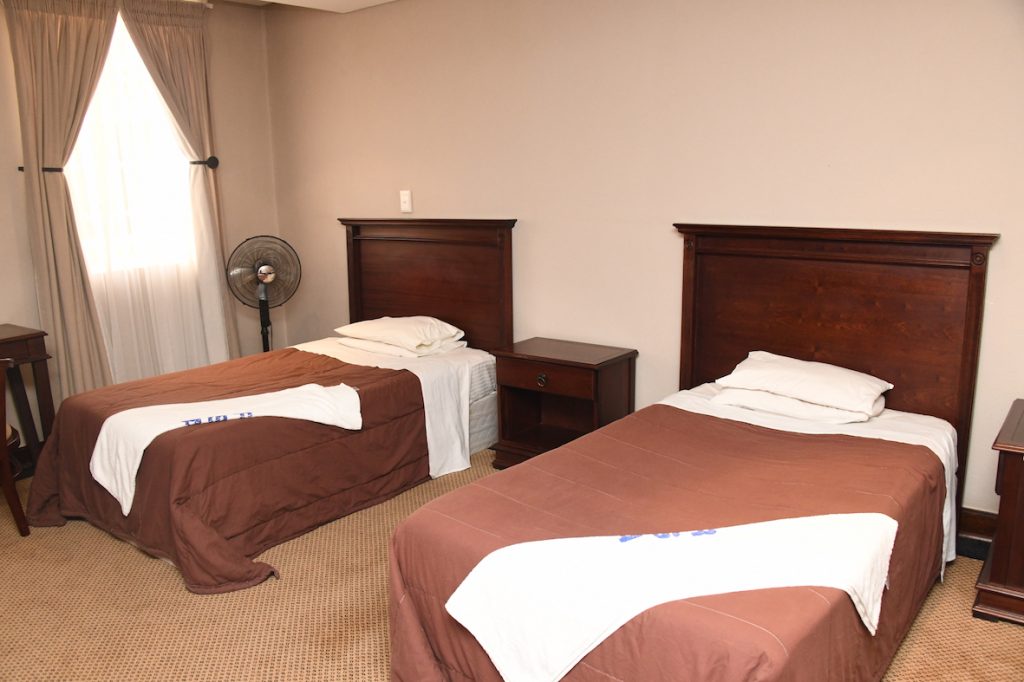Gauteng — the province with the most confirmed COVID-19 cases — is also one of the two provinces with the lowest uptake of quarantine facilities.
Only a third — 139 out of 438 — of government-approved facilities, where people who may have been exposed to the new coronavirus can quarantine at no cost, have occupied beds. Nine out of 10 of such facilities are hotels, bed and breakfasts or lodges from which the state rents rooms for between R850 and R1 200 per person per night.
In the Western Cape, only about one in five of the available quarantine beds were in use as of 30 June, according to a statement by the Western Cape MEC of Transport and Public Works Bonginkosi Madikizela.
According to the national department of health, a total of 12 532 beds are available across the country. On Sunday night President Cyril Ramaphosa, however, announced in his address to the nation that there are more than thrice that number of available beds: 37 000.
KwaZulu-Natal has 48 quarantine facilities, while Gauteng and the Eastern Cape have about half that number, according to health department data presented to Parliament.
The department couldn’t provide figures as to how many of these beds are occupied in each province at the time of publication.
Why do we need such state-sponsored facilities?
About one in four South Africans living in government-provided housing lives in overcrowded conditions, which a 2014 Statistics South Africa survey defined as having two or more people per room. Almost half of residents in informal settlements could also say the same, the report found.
Living in crowded spaces makes it impossible for people who have been exposed to the new coronavirus — but who have yet to test positive for it — to self-quarantine at home for the recommended 14 days without putting neighbours and family at risk of contracting the virus too.
People who need to self-quarantine include cases where someone does not yet have any COVID-related symptoms but where a person was in contact with someone who had been diagnosed with COVID-19 or may have otherwise been exposed to the virus. Those who went to get tested and are waiting for their test results should also be placed in quarantine.
Isolation facilities, on the other hand, are for people who tested positive for COVID-19, but do not require medical care. People who test positive for COVID, who are in quarantine facilities, are moved to isolation facilities or into an isolation section of a quarantine facility.
Both quarantine and isolation require that the person be able to stay in a separate room, where they have no contact with anyone else, for a recommended period of 14 days — the timeframe during which the World Health Organisation believes people with the virus may be infectious.

Yet despite the country’s rapidly increasing coronavirus infection rate — according to figures from the National Institute for Communicable Diseases the number of confirmed COVID-19 cases have been doubling every two weeks for the past month — the uptake of these facilities has been extremely low. So low that the department of health has assessed only about 8% of the 5 571 potential quarantine facilities that the public works department has identified.
Even fewer public quarantine facilities — 139 nationally — are actually running because of low demand.
“If people who don’t have facilities to self-quarantine or isolate are not taking up the opportunity to be isolated in facilities paid for by the state, then we have a problem,” Deputy Health Minister Mathuma Joseph Phaahla said last week during a parliamentary committee meeting.
“[Quarantine] really is the key to managing the pandemic so that our health services are not overwhelmed and so that we don’t get into a situation where it’s a runaway fire.”
On Sunday night Ramaphosa warned: “We know there are some people who are reluctant to isolate themselves…but it is essential that we do so if we are to break the chain of transmission…
You need to remain at home or in a place of quarantine while you are waiting for a test result to ensure that you do not transmit the virus without knowing it.”
According to Phaahla, it’s particularly the Western Cape and Gauteng that have low uptake. Gauteng now has the largest number of cumulative confirmed coronavirus cases since the country’s outbreak began in March, overtaking the Western Cape on Wednesday.
Phaahla said: “It means if ….there are about 2 000 people who tested positive over the last 24 hours, and there are 1 000 who can’t actually self isolate [at their homes], of whom only 100 are willing to go into facilities, then 900 are going to be roaming the streets and infecting families.”
What standards do facilities need to adhere to?
Before facilities can be contracted by the government, they have to meet standards such as 24-hour security, proper ventilation and internet access.
Government regulations require quarantine facilities to have adequate ventilation and space and to adhere to environmental health requirements such as adequate sanitation.
Sites that house more than 20 people need to have at least one nurse present at least eight hours a day, national guidelines say. The health department has to ensure that facilities comply with these regulations and that protective gear is available where required. Day-to-day management of these sites is left to a facility manager, appointed by the provincial health department.

Almost all of the identified facilities are privately-owned accommodation and come at a significant cost. The price of rooms billed to government depends on the hotel or guest house’s Tourism Grading Council of South Africa’s rating — a single room can range from R850 per night in a 1-star hotel to R1 200 per night in a 4-star hotel, according to the department of public works and infrastructure documents.
In May, the department told Parliament it had cost R28.67-million to rent 14 hotels for 2 125 people.
The state mostly opted against using its own facilities, because of concerns about costly renovations that would be required to bring buildings such as training facilities up to standard as well as the potential impact that related procurement delays could have on when such services would become available.
Why don’t South Africans want to use government quarantine facilities?
“Can I leave to visit my family?” and “Who will look after my house?” were some of the common concerns people who were asked to go to Western Cape quarantine facilities raised, the head of the Western Cape public works department, Jacqui Gooch, explained to Parliament in June. The same held true for those asked to go to isolation facilities.
According to Phaahla the stigma associated with going to a place of quarantine also plays a significant role in the lack of uptake.
According to a health portfolio committee member, Lindy Wilson, very few complaints have been received about the country’s quarantine sites.

A health department survey of 521 quarantine sites found that nine out of 10 facilities complied with the health department’s standards.
One notable exception in terms of quality was a Mpumalanga quarantine facility that housed more than 100 people. A health department investigation found that there was no full-time nursing staff at the site and, in one instance, a man in need of medical care waited six hours to be taken to hospital, Wilson says. The Pretoria High Court ordered the facility’s immediate closure in May, eNCA reported.
The national health department spokesperson, Popo Maja, explains: “The department is sailing uncharted waters and constantly improving and adjusting the processes as we learn more about the virus and pick up areas where we need to improve.”
Aisha Abdool Karim was a senior health reporter at Bhekisisa from 2020 to 2022.




